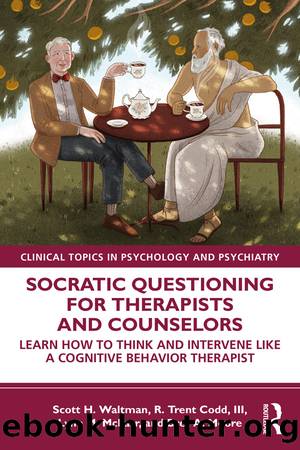Socratic Questioning for Therapists and Counselors by Waltman Scott H.;Codd R. Trent III;McFarr Lynn M.;Moore Bret A.;

Author:Waltman, Scott H.;Codd, R. Trent, III;McFarr, Lynn M.;Moore, Bret A.;
Language: eng
Format: epub
Publisher: Taylor & Francis Group
Published: 2020-03-15T00:00:00+00:00
Reductio ad absurdum
Reductio ad absurdum is a similar concept; although, clinically it can be difficult to pull off as it involves extending a statement to an extreme to make it sound absurd (Polya, 1973). This is a more extreme version of the general counseling skill, the amplified reflection, where you reflect back what the client said in a more strongly stated manner. An example of reductio ad absurdum would be if you had a client who was upset when a friend did not respond to their text message, you might ask then them if everyone must always respond immediately to their messages. Or, if you have a client who is worried about making a mistake on a task, then you might ask them if making a single mistake would make them into a complete failure. As you move into more emotionally laden content, this strategy is risky and generally not recommended as a frontline strategy, as it has a huge invalidation risk (Linehan, 1997), especially if you did not first lead with validation. The trouble with this strategy is that you are not actually evaluating the target belief, but are distorting the thought and then demonstrating that the distortion is distorted. This strategy is often used in political debates as a way of oversimplifying an issue. It can be hard to achieve lasting change or a deep conviction from this strategy.
Download
This site does not store any files on its server. We only index and link to content provided by other sites. Please contact the content providers to delete copyright contents if any and email us, we'll remove relevant links or contents immediately.
The Art of Thinking Clearly by Rolf Dobelli(9916)
The 5 Love Languages: The Secret to Love That Lasts by Gary Chapman(9283)
Mindhunter: Inside the FBI's Elite Serial Crime Unit by John E. Douglas & Mark Olshaker(8702)
Becoming Supernatural by Dr. Joe Dispenza(7836)
The Road Less Traveled by M. Scott Peck(7280)
Nudge - Improving Decisions about Health, Wealth, and Happiness by Thaler Sunstein(7246)
Mastermind: How to Think Like Sherlock Holmes by Maria Konnikova(6937)
Enlightenment Now: The Case for Reason, Science, Humanism, and Progress by Steven Pinker(6876)
Win Bigly by Scott Adams(6828)
The Way of Zen by Alan W. Watts(6289)
Factfulness: Ten Reasons We're Wrong About the World – and Why Things Are Better Than You Think by Hans Rosling(4489)
The State of Affairs by Esther Perel(4486)
Gerald's Game by Stephen King(4376)
Man's Search for Meaning by Viktor Frankl(4278)
The Confidence Code by Katty Kay(4040)
Thinking in Bets by Annie Duke(3998)
The Worm at the Core by Sheldon Solomon(3325)
Hidden Persuasion: 33 psychological influence techniques in advertising by Marc Andrews & Matthijs van Leeuwen & Rick van Baaren(3292)
Enlightenment Now by Steven Pinker(3274)
